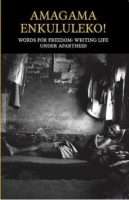THE BIG MOVE
It was the 9th day of February, 1955 and I recall that excitement ran high as meetings were held on township squares, street-corners and in churches. The people were urged not to move and the ANC promised to stand by them. Most stand-owners and businessmen exploited the political platforms for their own gain because the removals would mean a decline in profits and finally, loss of livelihood. But not all the people were businessmen and property owners. Some lived in horrible conditions and the promise of four-roomed houses doused the spirit of revolution in many of them. There were mixed feelings. However, the agitation increased, followed always by the usual police harassment. Houses, shops and church walls were painted in bold letters with defiant graffiti:
WE WILL NOT MOVE. WE WOULD RATHER DIE!
HE WHO COMES TO DESTROY WILL HIMSELF BE DESTROYED!
FREEDOM FOR OUR CHILDREN!
Bands of young people marched through the streets of Sophiatown and Newclare, carrying posters. Many were arrested, among them students and journalists; they paid admission of guilt fines and returned to the streets to protest and march again. Foreign newsmen and local journalists virtually lived in Sophiatown. They wanted to see it all; see the revolution in its initial stages. It was coming for sure, so we all believed.
For many of the homeless and destitute the removals augured well, for the sly government protagonists advised them to move. Were they not going to get their own houses with a large yard for their children to play in, and their own taps and lavatories? Was that not what they wanted? They would be away from the leeching Indian, Chinese and white businessmen; away from the unproductive Coloureds. There would be businesses and money and even power. Did not the big baas Verwoerd promise all this.
And so, the people sang…
… Are we not leaving behind the rusty tin shacks and crowded hovels? Nights of terror and uncertainty? Nights of death? Perhaps in the new place called Meadowlands it will be different. Perhaps our sons will become men before being cut down by violence and gangsterism. Perhaps our daughters will not become mothers before their time. Perhaps we will make love without the children peeping and laughing through the curtains dividing the room. Perhaps there will be peace of mind and escape from the cruel hands of the police. Perhaps, perhaps, Lord, perhaps…
On a dark morning early, near the winter of 1955, a strong contingent of police, soldiers and Saracen tanks surrounded Sophiatown. The armed units stood on alert as army trucks moved into the silent streets. There had been talk and promises by the ANC of resistance and revolt. The sun rose and briefly touched the shacks and houses.
A child must have stirred.
And dawn came. But it would be a day different from all other days. The beginning of the end. Rain, slow and deliberate, pattered down on the town. Too moved, perhaps too cowardly, the sun hid its face behind grey clouds. Bewilderment, laughter and strange expectation showed on the dark faces. Then, the move began, slow and deliberate like the rain.
In Bertha Street, I saw Father Huddleston help one family. A tall government employee who was directing the removals spat as the priest turned around. I cannot say that he spat at the priest, only that he did spit. I took in every detail of the move that my eyes could see. The wind lashed the people’s faces and the heavy-coated soldiers and the black policemen carried furniture to the waiting trucks. The priest smiled now and then, but his smiles gave no warmth. Perhaps it was the waving and calling, the tears of mixed feelings. Excitement and expectancy. And laughter and disappointment. Some people were singing: ‘Let’s leave, O my children, let’s leave Sophia alone, let’s go to a place where we’ll stay in peace, let’s go to Meadowlands.’
A group of student protesters marched down Bertha Street. They were surrounded and quickly hustled into a police van. Journalists from the world over had come for the revolt. They were disappointed, as lorries rode westward free of incident. A smile of victory must have crossed the face of Dr Verwoerd, wherever he was.
The exodus to Meadowlands was a long and tedious affair. The authorities must have wondered where all the people came from, because the more they moved, the more people there seemed to be. Shrewd politicians and businessmen who owned properties induced rural Africans to inhabit the vacant houses. The numbers swelled until the government authorities and the police introduced a permit system. When Klopper the Vicious stepped in, the night raids resulted in mass arrests. Bribery and corruption usually followed because the people always offered money. Those who could not pay were jailed. Men, women and children became the victims of the government’s brutal campaign to discourage unregistered tenants as well as the remnants of the ‘won’t-moves’. I have vivid recollections of those raids, when families scurried like squirrels and slept in the open veld and the broken-down buildings. Some took refuge in our yard. We were Coloured and thus temporarily immune to this one form of hardship. But it was inevitable that we too, would be forced to sell and move. It was just a matter of time.


